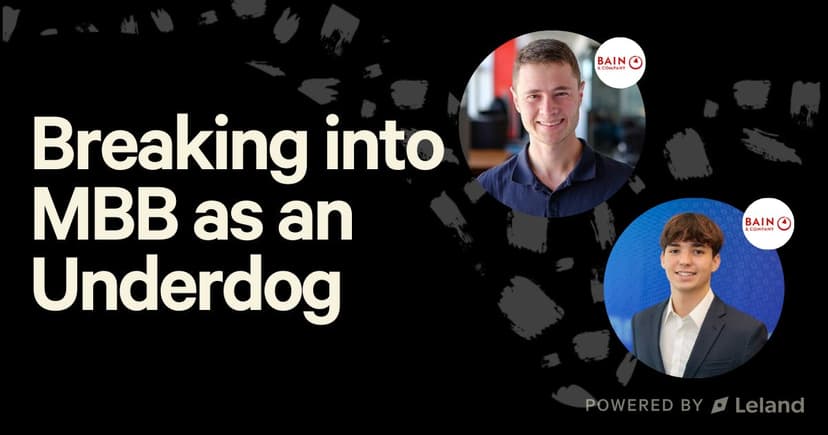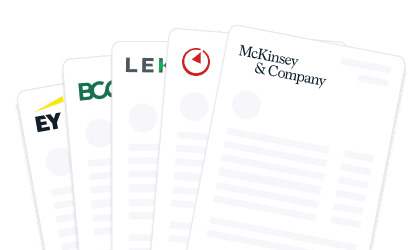How to Network for Consulting
Learn tips and tricks for networking so that you can land a coveted management consulting interview, including who to reach out to, how to approach them, what not to do, and more.

By Emilie W.
Ex-Consultant with extensive case prep experience
Posted June 13, 2025

Join a free event
Learn from top coaches and industry experts in live, interactive sessions you can join for free.
Table of Contents
Management consulting is one of the most sought-after industries for ambitious college graduates. It is very competitive for its high levels of compensation, interesting work, and fantastic exit opportunities.
In order to get a job at a top consulting firm, you have to know people. Networking for consulting is different from other, similar fields. From coffee chats to cases, the entire process is very formulaic. In this article, we’ll provide you with a guide to consulting networking, so that you’ll be in the best possible place when recruiting season does roll around.
What Do You Need to Break Into Consulting?
Before you start networking, however, it can be beneficial to get an idea of what a strong candidacy looks like. You won’t be jumping straight into cases or other technical prep. Also, if you want to start meeting people at major management consulting firms, you should be able to do so confidently.
From a macro point of view, this is how you can build a strong application from the beginning:
- Start early with your preparation
- Research all your target firms and the differences between them
- Network with industry professionals
- Maintain a high GPA and ACT/SAT
- Gain relevant work and leadership experience
- Communicate impact on your resume
- Take the cover letter seriously (if the firm requires one)
- Apply to several firms to cast a wide net
When you actually start putting together your application for a consulting job, you’ll need to weave all these parts together to create a compelling reason they should hire you. Your standout candidacy will not come from a jumble of accomplishments, but rather from how they interact with each other.
How to Start Networking
I decided I wanted to pursue a career in consulting when I was in my sophomore year of my undergraduate degree. I researched the industry and top management consulting firms and learned what a case interview meant. However, it wasn’t long before I realized that many of my target consulting firms did not typically hire students from my university. There were only a few on-campus recruiting events for consulting and alumni who had successfully landed a consulting offer before me. I realized that in order to get my foot in the door and make sure my resume was considered, I needed to network effectively. This took extra effort but paid out in the end as I not only received an offer from one of my target firms but also made close connections with consultants across firms that have become invaluable later on.
Prior to reaching out to people, there are a few things that you should do that will ensure you are going about the process both efficiently and effectively. First, figure out your motivations for pursuing consulting, and what attracts you to each firm. Insincerity is not difficult to spot, and knowing your “why” will help you present a cohesive story.
Relatedly, research the firms and the recruiting process so that you come off as informed and prepared. In addition to improving your overall experience if you do get hired, having background knowledge will give the recruiter another reason to help you. As a consultant who has hopped on many calls with prospective applicants, I can tell you that conversations about what an applicant is passionate about and why they are interested in our firm are much more compelling and impressive than answering questions that could be found on any consulting firm’s website.
Once you actually start networking, be intentional with whom you reach out to as well as how you do so. Find connections and connections of connections that have a similar background to you so that you have some common ground on which to build a connection. This could include an alum of your school, or maybe someone from the same geographic area, or perhaps they studied the same, non-traditional subject in college. We’ll go into this in more detail below.
After you’ve reached out to them, come prepared with thoughtful questions. As a general rule of thumb, don’t ask questions that you could have found the answer to online, for example, specificities about the application, consulting timeline, etc. Instead, talk about their unique experience with the firm. How did recruiting from a non-Finance major affect the process? What would they have done differently? Similarly? With X background, what has their experience with the firm been?
Finally, after you’ve had a conversation, follow up with a thank you note. For any chance of continuing the relationship, you’ll want to show real gratitude to the consultant for their time.

How to Decide Who to Reach Out to
When I was first learning about the consulting industry, it at first felt like I did not know anyone to who I could naturally reach out. However, through several conversations with family and friends, and a quick search through LinkedIn, I quickly identified several people in my extended network who had experience in the industry.
When deciding who to reach out to, think about the following characteristics:
- A spectrum of roles: Ideally, you’ll want to reach out to people in a variety of stages within the company, from entry- to mid-level. It may be helpful to start with those in more junior roles, as they are more likely to remember being in your shoes and therefore may be more willing to take their time to chat with you. Depending on the firm, they may be more connected to the recruiting function and would be a good person to ask more logistical questions or application advice in a low-risk setting. Once you have made a good connection with entry-level consultants, you can be more confident reaching out to those with more tenure.
- Natural connections: The consultants most likely to work with you are those the closest to your first connections, the people you know directly. In other words, try to find first or second connections at your target firms rather than cold contacting consultants.
- School alumni: School alumni are a great resource to use because you have a shared background from the very start.
- Consultants from a wide net of firms: In tangent with researching the different firms, talking to consultants from a wide variety of companies will give you a better idea of what working at the different ones would actually be like.
- Those who are a part of school networking teams: These are great people to reach out to because it is part of their job to talk to you. However, keep in mind that when recruiting season arrives, they will be swamped with requests. Start demonstrating your interest and building the relationship from early on so that it has time to naturally progress.
How to Reach Out to People
At this point, you know how you should go into networking and decide who to target. So, how do you actually go about contacting them?
It is a good idea to build the relationship far in advance of when you actually need help. It is a terrible idea to email a consultant and say, “Please refer me, the deadline is next week.” If you can, reach out six months or more before recruiting season and start by learning about their experiences. This allows the relationship to develop organically and provides you with the opportunity to maintain contact up to and beyond the time when applications are due. You will have a strengthened relationship with an increased likelihood of getting their referral or advice.
When you reach out, put yourself in the shoes of the consultant. Their time is very valuable to them; they’re likely traveling at least four days a week and are probably sleep-deprived. To keep this in mind, I suggest being friendly and concise with any communication you have with them (e.g., email, LinkedIn message), and if they agree to meet with you, schedule the call for 20-30 minutes or less.
Remember: when you are networking, consultants want to see that they can be friends with you and that you can be trusted when communicating with their colleagues, and ultimately, a client. Be friendly, approachable, and most importantly, professional. In everything, though more so with consulting networking, you are being judged for every action. They are watching to see if your language and emails are professional, if you provide the Zoom Link ahead of time if you show up to meetings punctually, etc.
Make a good impression, and they will want to help you! The people you are reaching out to at consulting firms have a strong interest in finding people they like to work with.
What to Talk About in a Networking Conversation
When going into the conversation, recognize that the time you have is limited so you’ll need to prioritize what’s most important. The majority of that conversation’s content should come from homework you’ve done beforehand. Learn about the person and let them know why you chose them, in particular, to reach out to.
If you’ve followed the steps up to this point, then you’ll have chosen someone with some kind of similar background, interests, etc. and this can also help direct the conversation. As mentioned above, don’t talk about things you can find out on the internet. As one of our expert coaches, Jeremy S. says, “Always lead with genuine curiosity and authenticity.”
Networking Tips and Strategies for Consulting
Networking in the consulting industry is crucial, not just for landing interviews but for gaining valuable insights and building long-term professional relationships. The following tips and strategies will help you navigate the networking process effectively, ensuring that you stand out to recruiters and consultants alike.
Start Early and Be Proactive
Begin networking well before recruiting season. This gives you ample time to establish genuine connections without the pressure of impending deadlines. Reach out to consultants, attend networking events, and join relevant industry groups to start building your professional network early.
Starting early also allows you to refine your approach over time, learning from each interaction and gradually honing your networking skills. Being proactive shows your commitment to the industry and gives you a head start over others who may wait until the last minute.
Be Strategic About Who You Contact
Focus on building connections with individuals who can offer the most value to your journey. This might include alumni from your school, consultants in your target firms, or professionals with a similar background to yours. Prioritize quality over quantity in your networking efforts.
Consider the influence and insight that different contacts can provide—junior consultants might offer candid advice on breaking into the field, while more senior consultants could give you a broader perspective on the industry and potential career paths. A well-rounded network will provide a diverse range of support and opportunities.
Tailor Your Approach for Each Connection
Personalize your outreach based on the person you’re contacting. Mention common connections, shared backgrounds, or specific reasons why you’re interested in speaking with them. This shows that you’ve done your homework and are genuinely interested in their insights.
Taking the time to tailor your approach also increases the likelihood of receiving a positive response, as people are more inclined to engage when they feel personally valued. Remember, a generic message can easily be ignored, but a well-crafted, individualized one demonstrates effort and sincerity.
Prepare Thoughtful Questions
Before any networking conversation, prepare a list of thoughtful questions that can’t be easily answered through online research. Focus on learning about their personal experiences, career paths, and any advice they have for someone in your position.
Asking insightful questions not only helps you gain valuable knowledge but also leaves a lasting impression on the person you’re speaking with. It shows that you are genuinely interested in their perspective and that you value the opportunity to learn from their experience. This kind of preparation can set you apart from other candidates who may ask more superficial or generic questions.
Follow Up and Maintain Relationships
After your initial conversation, follow up with a thank you note expressing gratitude for your time and insights. Keep in touch periodically, updating them on your progress and seeking further advice. Building and maintaining relationships is key to successful networking.
Regular, thoughtful follow-ups help keep you on their radar without coming across as pushy. You could share relevant articles, congratulate them on career milestones, or simply check in to see how they’re doing. These small gestures go a long way in building a rapport that could benefit you throughout your career.
Leverage Online Platforms
Utilize platforms like LinkedIn to connect with professionals in the consulting industry. Join relevant groups, participate in discussions, and share industry-related content to increase your visibility and engagement.
Engaging with online content, whether by commenting on posts or publishing your own insights, can help you establish yourself as an informed and active member of the consulting community. Additionally, maintaining an updated and polished LinkedIn profile can serve as a digital resume that showcases your skills, achievements, and professional interests to potential contacts.
Be Genuine and Authentic
Authenticity is critical in networking. Rather than trying to impress, focus on building real, meaningful connections. Consultants can easily spot insincerity, so be yourself and approach networking as an opportunity to learn and grow.
Being genuine in your interactions will foster trust and make it more likely that consultants will want to help you. Authenticity also leads to more enjoyable and productive conversations, as you’ll be engaging with others on a level that’s honest and mutually beneficial. Over time, these authentic connections can evolve into strong professional relationships that support your career long-term.
The Importance of Building a Personal Brand in Consulting
In a competitive field like consulting, where thousands of candidates vie for a limited number of positions, building a strong personal brand is crucial. Your personal brand is essentially how you present yourself to the professional world—what you stand for, your unique strengths, and the value you bring to a consulting job. By clearly defining and communicating your personal brand, you can differentiate yourself from other candidates and make a lasting impression on recruiters and consultants.
Start by identifying your core skills and experiences that align with the consulting industry. Are you particularly strong in problem-solving, data analysis, or leadership? Highlight these strengths in your resume, cover letter, and during networking conversations. Additionally, consider creating content related to consulting—such as blog posts, LinkedIn articles, or even videos—that showcase your knowledge and insights into the industry. This not only reinforces your expertise but also increases your visibility to potential employers.
Remember, your personal brand should be authentic and consistent across all platforms and interactions. Whether you're networking, interviewing, or simply updating your LinkedIn profile, ensure that your brand reflects the professional image you want to project. In the end, a strong personal brand can be the key to securing the consulting job you desire.
By following these strategies, you'll not only expand your network but also position yourself as a strong candidate when it comes time to apply for consulting roles. Networking is more than just a means to an end—it's about creating a foundation of relationships that can support your career for years to come.
Consulting Networking: What NOT to Do
Now that we’ve covered how to successfully network for a role in consulting, we’ll talk about a few things that you should not do.
1. Over-pitch yourself
Because you know that you’re constantly being evaluated, it’s easy to go into networking conversations like a behavioral interview. For example, they ask a question about your background, and you immediately launch into a repetition of your resume. Don’t do this. Remember that it is not an interview, but rather a conversation.
Similarly, when responding to questions, don’t answer in a way that you think the consultant wants to hear. There is no correct answer during a coffee chat. They’re trying to get to know your background, interests, and goals, and not answering naturally will only hurt your candidacy later on.
2. Request too much
Oftentimes, if the first few coffee chats go well, the consultant/recruiter will offer to help with case prep. One faux pas that many applicants make here is taking advantage of that offer by requesting too much. It’s okay to take them up on it, but don’t ask for five cases over the next two weeks. This point relates to the general tip of being aware of the consultant’s time.
I would also be careful to not be too eager to request a referral or introduction to other colleagues. Hopefully, these referrals or introductions occur naturally. However, if you force this request, it can put the consultant in an uncomfortable position as they may not have the right relationships or it may not be the right timing for them.
4. Coming unprepared
Finding someone with a similar background and then getting them to accept a meeting is only the very, very beginning of networking for consulting. If you’ve started early, then the first meeting will primarily be for getting to know each other. Even then, you should come up with topics to talk about and thoughtful questions. A consultant’s time is valuable and one way that you can show you recognize this is by making the most of every second.
Also, the questions you ask will be clear indicators of how prepared you are. They’ll know how much you looked into their background, the firm, the industry, and the recruiting process based on the topics you choose to talk about.
Emilie W. is an MBA Candidate at Harvard Business School. She was accepted as a deferred applicant her senior year in college and worked at Oliver Wyman before matriculating. She is passionate about helping you shape the future you want! Book a FREE intro call with Emilie today!
Browse the rest of our consulting coaches here.
Here are some other articles you may find helpful:
- A Day in the Life of a Management Consultant
- An Expert’s Guide to Resumes: 5 Tips to Make You Stand Out
- Best 30 Free Resources to Get Into Management Consulting
- How to Negotiate Your Salary - with Example Emails
- Five Tips to Break Into Management Consulting
- From No Offers to Multiple Offers: How to Take Your Casing to the Next Level
- What to Major in for Consulting
- How to Succeed in a Consulting Career - An Expert Coach's Guide

Written by Emilie
5.0
(9)
Hi! It's so nice to meet you! I am currently an MBA student at Harvard Business School, and I am loving it. It is an incredible experience to meet future leaders from around the world, learning from some of the best faculty there is. Prior to b-school, I spent two years in Management Consulting at Oliver Wyman. Being here, reflecting on my career thus far, makes me even more excited for you and your aspirations. I can't wait to help you achieve your goals! A bit about me: I am originally from Salt Lake City, Utah where I attended the University of Utah for my undergrad. I studied quantitative business economics, and decided to pursue a career in consulting. It was in my senior year that I also decided to pursue an MBA. With the help of several mentors, I applied for Harvard Business School's 2+2 program, which meant that I would be accepted to business school while in my undergrad, with the expectation that I would go work full-time for 2 years before matriculating. I remember the day I got my admission letter - it was such a rush of emotion! After college, I moved to the great state of Texas, to work in management consulting firm Oliver Wyman's Dallas office. There I fell in love with my now husband (and with good BBQ). I also learned that I love to work with people! I specialized in my firm's People and Organizational Performance practice, letting me work with companies across the country looking to improve their culture, leadership, and organizational design. It was a lot of fun! And now I'm here at Harvard. I'm loving the MBA program, as well as all of the classic Boston experiences (Red Sox games, cannolis in the historic Italian North End, walking by the Charles River, and so much more). I'm excited to meet all of you, and help you shape the future you want!
Emilie has helped clients get into organizations like:
Browse hundreds of expert coaches
Leland coaches have helped thousands of people achieve their goals. A dedicated mentor can make all the difference.


























